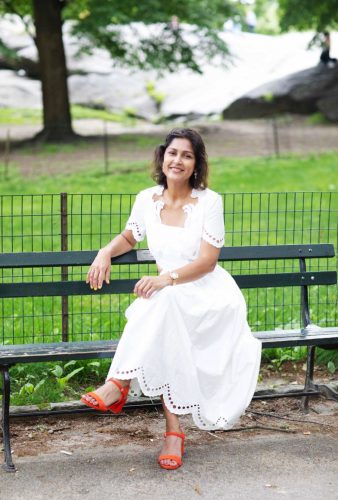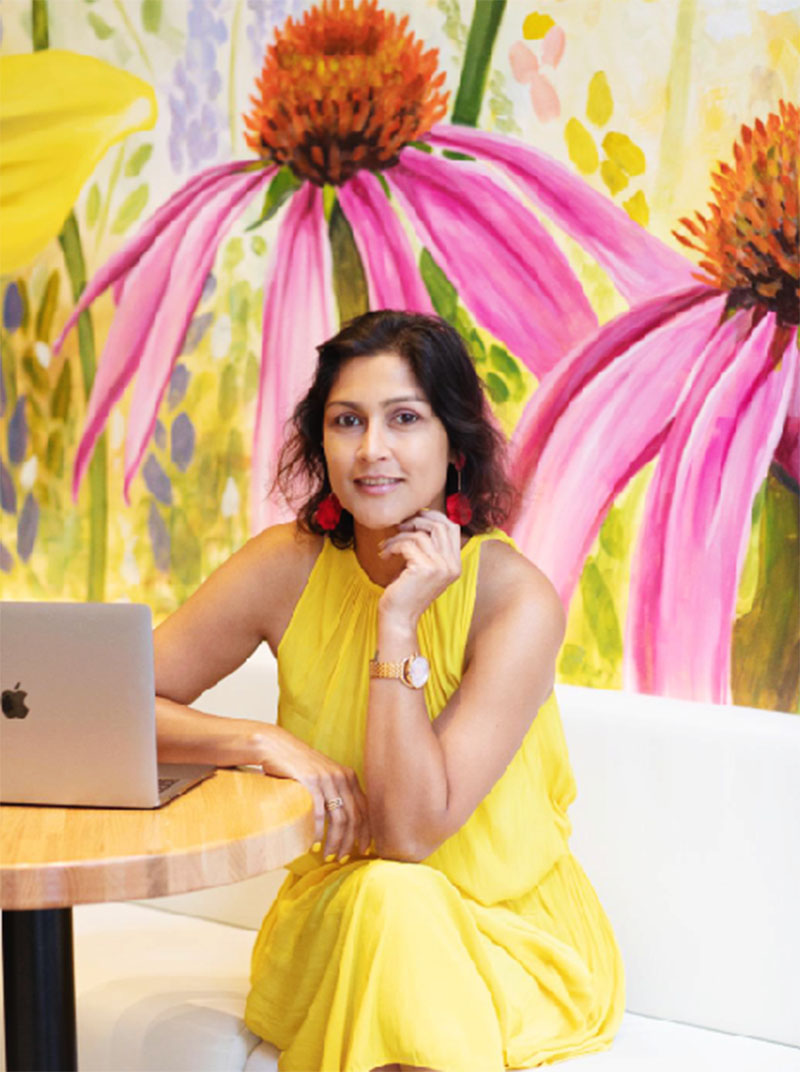Having gone through what she has described as “a number of heartbreaks”, including acting in the best interests of her daughters and separating from them while they were young, and being in an abusive relationship, life coach Annalisa Bahadur believes she is in a position to help people heal from the many heartbreaks they may have had to face and in doing so she strategically focuses on men.
Describing herself as an unorthodox heartbreak coach, Bahadur said it is her niche because she has had to heal from a number of heartbreaks over the last few decades. She pointed out as well that heartbreak does not only occur when a romantic relationship ends, but involves any pain from various life experiences. When people do not heal properly, it affects their confidence. The pain also piles up as they continue to have other experiences and this can lead to anxiety.

“It is something I have learnt to do very well. I like where I am at emotionally, psychologically, spiritually and physically. I think this is the best time of my life and so what I do now is I teach that to clients who are going through heartbreaking situations or who have suffered from trauma, going all the way back to childhood… and how it affects their lives now,” the life coach said in a recent interview.
While her practice is based in New York, in the United States, Bahadur said she has also worked with Guyanese and other international clients over the years and she is now in the process of setting up a non-governmental organisation (NGO) here.
Interestingly, Bahadur said most of her clients are men and so the NGO would be focused on men as, according to her, patriarchy has created a lot of pain and hurt.
“And while we women tend to feel that we are the only victims of it, because our men don’t know how to embrace their emotional side, which we need to build better, stronger relationships, men struggle a lot,” she added.
The NGO, which would be located in Berbice, would explore how companies can lend support to men who have lost their jobs, give help for at least six months and work with other agencies to find job placements for them. Situations like job loss affect men emotionally and they do not know how to handle it, she said. She also hopes the NGO would offer assistance to people migrating to Guyana in an effort to help them to adjust to Guyana’s culture.
Even though she is encouraged to widen the coverage of the NGO, Bahadur maintained that she does not believe that men get the attention they need, especially in Guyana’s culture and there is also a stigma attached to them seeking help.
Bahadur combines her coaching certificate and a psychology degree with life experiences to create programmes to steer her clients from a state of emotional turmoil to a “more successful life”.
Since the majority of her clients are men for whom she creates a “safe space” the life coach pointed out that she is already in the field and she understands their needs and how they need to be approached in order for them to open up and communicate their feelings. Men, she said, are in some cultures seen as weak if they cry or say ‘I love you’ without feeling as if they have lost control and this causes unnecessary pain.
Painful experiences
Getting into this line of work started with years of painful experiences for Bahadur and blaming others for the experiences caused more pain for her as she pointed out that throughout the years she kept making the same mistakes over and over.
It was her move to India at age 26, after she had divorced and had three daughters, which triggered change, painfully so, that eventually brought her to where she is today.
Bahadur shared that she was married at 20, but by then the couple already had a daughter who was a year and a half. At age 21 she had her second daughter and at 23 the third. By the time she was 25, she and her husband realised that they could no longer live together. At that time they were looking for support through counsellors and therapists but had no access to such assistance.
“Eventually that marriage ended [and] to provide a better lifestyle for the girls, I decided to permit their father to take them up to Canada where they would be raised… It was a really difficult time for me to cope with all of that and then again not having anyone to turn to and talk to and then facing the judgement of my culture. I was considered a bad parent,” Bahadur said.
The former television journalist said that within six months of her daughters leaving, she went to India, where she became involved in an abusive relationship. She remained in that country for three years.
“That’s when really, I think, I realised that I just could not keep going through this pain. I could not live with this pain anymore as I wanted so much more for myself and I felt like I was hitting rock bottom and I had to do something,” she shared.
Her first order of business was googling ‘how to get out of an abusive relationship’, taking mental notes and slowly getting out of the relationship on her own. Buddhism, which she discovered, she said, helped to strengthen her spiritually and mentally.
Bahadur said in that process as well she started to see a pattern and realised that it wasn’t the people in her life who were causing the pain, but rather she was attracted to certain behaviour patterns and when she got into the relationships she “was trying to fix the person instead of fixing myself”.
In her practice, Bahadur said, she now teaches people to find what works for them when dealing with certain issues as the one-size-fits-all approach does not work. She added that in Guyanese culture, people are not often taught how to “think and communicate” effectively but rather “to do as someone else says….”
And when people become adults, emotional turmoil is created as they struggle internally against what they were taught and what they believe they should do.
“But if you really listen to your inside, your intuition, your answers are right there but … we were not taught how to think. How does our body tell us what to do? We are caught in hearing the body at times… and then what will these people say, what will these people do…,” she said.
She recalled again how she was harshly judged when she permitted her husband to take their children to Canada. She noted that she and her ex-husband had always maintained that no matter what, they would always remember that the children did not ask to come into the world and it was their responsibility to make sure they were always taken care of.
As a result they remained in contact and built a better relationship than they had as a married couple, as their focus was strictly on the children. Over the years, she would visit the US (she had a visa) and her ex-husband would drive the children over to visit with her.
The girls are now 23, 22 and 18 and Bahadur said she has a great relationship with them and for her in the end she made the best decision for her children.
She shared that she was 13 when her mom died at the age of 39 in childbirth and one of the lessons she got from her death was that life was just too short to stay in relationships that were not working.
Her mother died on Christmas Day and another life in the form of her youngest sister was brought into the world.
In India, Bahadur completed a degree in psychology and she started to fix herself as well as change the habit of starting things and then leaving them midway; it was this resolve that ensured that she completed the degree.
She eventually moved to the US and remarried and is now also the mother of an 11-year-old son.
“I wanted another chance of being a present mom, because I had missed out on so much on my girls,” she said.
However, she maintained that she never regretted the decision of permitting them to move to Canada because they are “incredible human beings. All of them are just so wise and kind and thoughtful people and they have the education I wanted them to have. They have the medical care which was a little more of a problem in Guyana at that time when they left…”
The bottom line was that she wanted a better life for her daughters than she thought she could have given them here. They had a present father and they were loved and taken care of. She said as well that while she and her ex were not compatible partners, he is an incredible dad.
Ripple effect
In her work, Bahadur said, she has noticed that a ripple effect is being created as clients are also now reaching out and asking for assistance in communicating with their children, teaching them how to set boundaries and generally just how to grow into healthy, independent adults.
People are learning to be more appreciative of “the little humans”, she said, even though Guyanese culture has taught people to say, “I am the adult and you do what I tell you to do or I would smack you around”. This attitude, she said, does not work and it destroys relationships and even when they become adults, children are afraid to have open discussions with their parents because they are afraid of their reaction.
Prior to leaving Guyana, Bahadur worked at Little Rock television station and at GTV (now NCN) where she also co-hosted the morning show. She also anchored the news on CNS Channel 6 and VCT Evening News. She said she remained in journalism for a while until it went against her values and training, but acknowledged that she learnt a lot during those years.
Bahadur said everything in her past has led her to where she is today and she has an “incredible partner” and is a good place. Today it is hard for her to see someone go through pain and not want to help them get through it.
She got her life coach certificate in 2015, but it was in 2018 when she dealt with another personal heartbreak that she really started putting her skills to work.
“I said to myself, but wait a minute instead of sitting around and crying and waiting for everything to fall apart, how about I get excited about what is about to come into my life now? It was really a quick change of thinking and I recognised as well that your thoughts really control your emotions,” she said.
Now she wouldn’t change anything even though she believes no one should have to endure what she did in life. At the end of it all it is good to help others get through similar situations, which she would not have been able to do without those experiences.
She gave the example of speaking out about being raped and no one believing. But after she made a Facebook post, Bahadur said, she got a flood of email and messages from people who had similar experiences.
Bahadur has also started the June Nariman (the name of her late mother) Pay It Forward Foundation, through which, every six months she provides pro-bono coaching for a period in her honour. She has also started a podcast.






